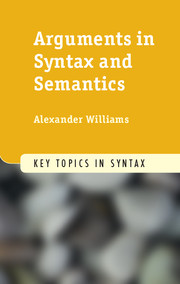Book contents
- Frontmatter
- Dedication
- Contents
- Acknowledgments
- List of abbreviations
- Introduction
- Part I Background
- Part II Kinds of arguments
- Part III Analysis of argument relations
- 6 Thematic relations
- 7 Agent and Patient
- 8 Role iteration
- 9 Separation
- 10 Event structure
- 11 Linking and framing
- Part IV Case studies
- Glossary
- References
- Index
6 - Thematic relations
Published online by Cambridge University Press: 05 January 2015
- Frontmatter
- Dedication
- Contents
- Acknowledgments
- List of abbreviations
- Introduction
- Part I Background
- Part II Kinds of arguments
- Part III Analysis of argument relations
- 6 Thematic relations
- 7 Agent and Patient
- 8 Role iteration
- 9 Separation
- 10 Event structure
- 11 Linking and framing
- Part IV Case studies
- Glossary
- References
- Index
Summary
INTRODUCTION
Sometimes a dependent is claimed to instantiate a thematic relation. Familiar labels for very general thematic relations include Agent, Patient, Experiencer, Instrument, Source, Location and Goal. Besides these there are specific thematic relations such as ‘thing carried in a carrying.’ For the linguist who uses thematic relations, there are two big questions. What is the justification for using any thematic relation? And if there is a thematic relation in the meaning of an expression, exactly which relation is it? I discuss the first question in Sections 6.3 and 6.4, and the second briefly in Section 6.5. The next chapter (Chapter 7) then concentrates specially on Agent and Patient. Before all this (Section 6.2), I clarify what we are talking about.
WHAT ARE THEMATIC RELATIONS?
What is it that makes a relation thematic? On classic uses of the term, it is something grammatical: thematic relations are predicated of just one dependent and not more. They do not relate the meanings of two dependent expressions, both the subject and the object for example, but rather interpret just a single dependent in relation to the head. When a dependency is interpreted by a thematic relation, its interpretation is separate from that of any other (Schein 1993).
To see the point, compare (1) and (2) below. These are two distinct hypotheses about the meaning of the same sentence. In (1), a single relation, called Carrying By Of, is predicated both of the subject and of the object. Because this relation is predicated of both dependents, it is not a thematic relation, not in the classic sense to which I will adhere.
(1) a Navin carried the chair.
b ≅ ∃e[CarryingByOf(e, Navin, the chair)]
Now contrast (2). Here the subject and the object provide terms in two separate relations: Navin names a term in the Carrying By relation, but the chair does not, while the chair names a term in the Carrying Of relation, and Navin does not.
- Type
- Chapter
- Information
- Arguments in Syntax and Semantics , pp. 121 - 140Publisher: Cambridge University PressPrint publication year: 2015



